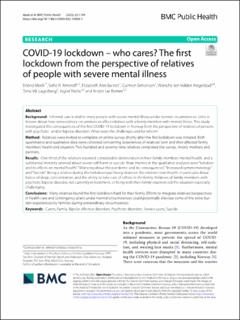| dc.contributor.author | Mork, Erlend | |
| dc.contributor.author | Aminoff, Sofie Ragnhild | |
| dc.contributor.author | Barrett, Elizabeth Ann | |
| dc.contributor.author | Simonsen, Carmen Elisabeth | |
| dc.contributor.author | Hegelstad, Wenche | |
| dc.contributor.author | Lagerberg, Trine Vik | |
| dc.contributor.author | Melle, Ingrid | |
| dc.contributor.author | Romm, Kristin Lie | |
| dc.date.accessioned | 2023-02-17T13:34:37Z | |
| dc.date.available | 2023-02-17T13:34:37Z | |
| dc.date.created | 2022-09-06T17:40:58Z | |
| dc.date.issued | 2022 | |
| dc.identifier.citation | Mork, E., Aminoff, S. R., Barrett, E. A., Simonsen, C., Hegelstad, W. T. V., Lagerberg, T. V., ... & Romm, K. L. (2022). COVID-19 lockdown–who cares? The first lockdown from the perspective of relatives of people with severe mental illness. BMC public health, 22(1), 1-12. | en_US |
| dc.identifier.issn | 1471-2458 | |
| dc.identifier.uri | https://hdl.handle.net/11250/3052002 | |
| dc.description.abstract | Background
Informal care is vital to many people with severe mental illness under normal circumstances. Little is known about how extraordinary circumstances affect relatives with a family member with mental illness. This study investigated the consequences of the first COVID-19 lockdown in Norway from the perspective of relatives of persons with psychotic- and/or bipolar disorders: What were the challenges and for whom?
Method
Relatives were invited to complete an online survey shortly after the first lockdown was initiated. Both quantitative and qualitative data were collected concerning experiences of relatives’ own and their affected family members’ health and situation. Two hundred and seventy-nine relatives completed the survey, mostly mothers and partners.
Results
One-third of the relatives reported considerable deterioration in their family members’ mental health, and a substantial minority worried about severe self-harm or suicide. Main themes in the qualitative analyses were “Isolation and its effects on mental health”, “Worrying about the pandemic and its consequences”, “Increased symptomatology” and “Suicide”. Being a relative during the lockdown put heavy strain on the relatives’ own health, in particular disturbance of sleep, concentration, and the ability to take care of others in the family. Relatives of family members with psychotic bipolar disorder, not currently in treatment, or living with their family experienced the situation especially challenging.
Conclusions
Many relatives found the first lockdown hard for their family. Efforts to integrate relatives’ perspectives in health care and contingency plans under normal circumstances could potentially alleviate some of the extra burden experienced by families during extraordinary circumstances. | en_US |
| dc.language.iso | eng | en_US |
| dc.publisher | BMC | en_US |
| dc.rights | Navngivelse 4.0 Internasjonal | * |
| dc.rights.uri | http://creativecommons.org/licenses/by/4.0/deed.no | * |
| dc.title | COVID-19 lockdown – who cares? The first lockdown from the perspective of relatives of people with severe mental illness | en_US |
| dc.type | Peer reviewed | en_US |
| dc.type | Journal article | en_US |
| dc.description.version | publishedVersion | en_US |
| dc.rights.holder | The authors | en_US |
| dc.subject.nsi | VDP::Medisinske Fag: 700 | en_US |
| dc.source.pagenumber | 1-12 | en_US |
| dc.source.volume | 22 | en_US |
| dc.source.journal | BMC Public Health | en_US |
| dc.source.issue | 1 | en_US |
| dc.identifier.doi | 10.1186/s12889-022-13458-5 | |
| dc.identifier.cristin | 2049279 | |
| cristin.ispublished | true | |
| cristin.fulltext | original | |
| cristin.qualitycode | 1 | |

